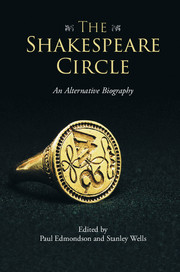Part III - Colleagues and Patrons
Published online by Cambridge University Press: 05 November 2015
Summary
Among Shakespeare's most significant colleagues are some of his closest and longest-lasting friends. We decided to place three of the most significant people in his professional life – Richard Burbage, John Heminges and Henry Condell – here because their intertwining careers seem to have been the foundation of strong friendships. Other members of the Burbage family, James the father and Cuthbert, Richard's older brother, were among Shakespeare's professional friends. Among the colleagues included here are several rivals. Playwrights who collaborated, it may be assumed, were by the nature of their profession always seeking to outshine their colleague-competitors.
Andy Kesson presents Shakespeare as a newcomer on an already well-established literary and theatrical scene, re-reading the famous remarks published in Greene's Groatsworth of Wit (now attributed to Henry Chettle) not as an attack from which Shakespeare needs defending, but ‘as the opportunity to see the early Shakespeare from the perspective of his new colleagues in the London theatres’ (p. 236). Some writers who collaborated with Shakespeare may not yet have been identified; likewise ‘Shakespeare’ may still be quietly present in plays in which his hand has not yet been identified. As a result of this, some of his writing may ‘survive in forms which are no longer associated with his authorship’ (p. 246).
Setting the scene for Shakespeare's arrival was the Burbage family of which the founding patriarch, James, was influential and innovative in the emergence of what was to become the professional theatre. His brother-in-law, John Brayne, financed the first public playhouse, The Red Lion in Stepney, ‘the structural model for all the outdoor theatres that followed it’ (p. 250), the first of which, The Theatre, was built by James Burbage. As John H. Astington points out, James was a member of the Earl of Leicester's Men, the most prominent company of its day. It performed in Stratford-upon-Avon in 1573 when Shakespeare was nine, and ‘we may think that Shakespeare's turn to the theatre was influenced in his boyhood by Richard Burbage's father’ (p. 250). The Burbages remind us of the tough-edged nature of the theatrical profession; Richard himself was referred to as ‘a stubborn fellow’ (p. 254). They seem to have been around at Shakespeare's initiation into the world of the theatre, and would remain there for the rest of his life and beyond.
- Type
- Chapter
- Information
- The Shakespeare CircleAn Alternative Biography, pp. 231 - 234Publisher: Cambridge University PressPrint publication year: 2015

